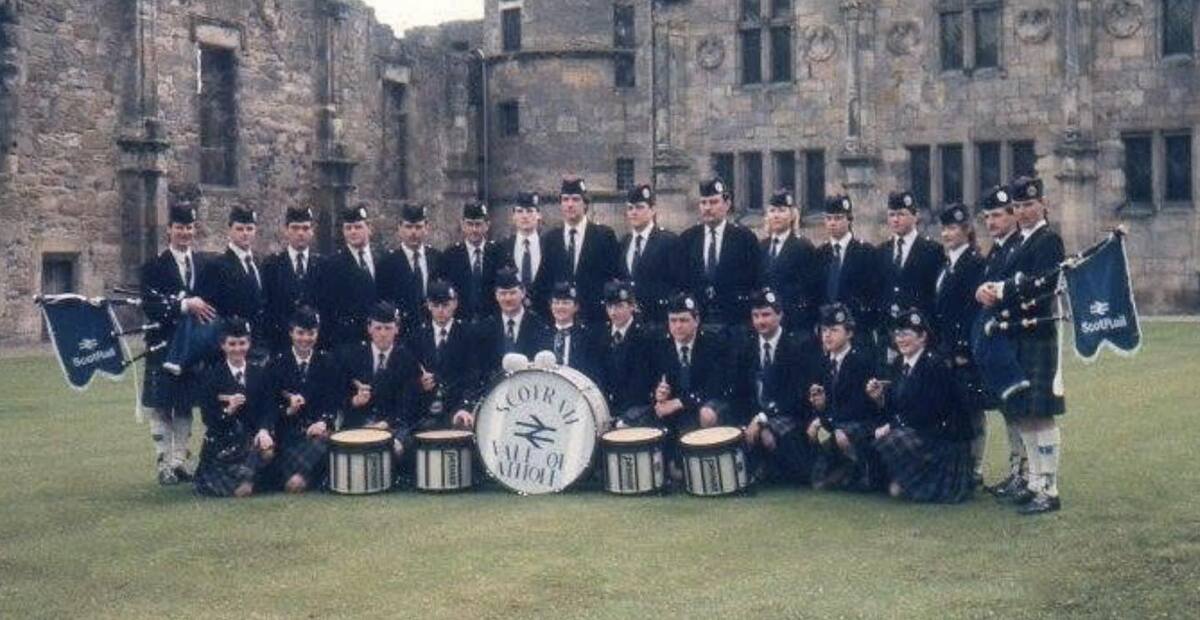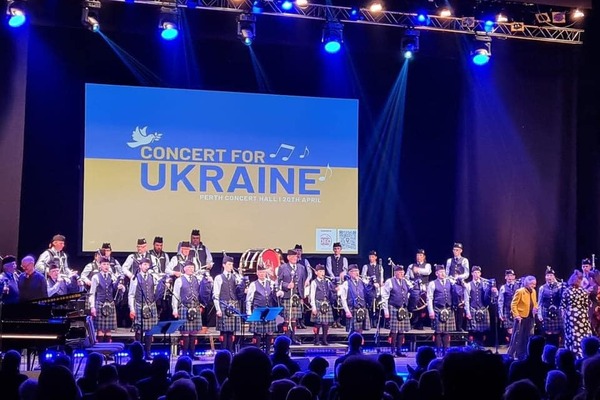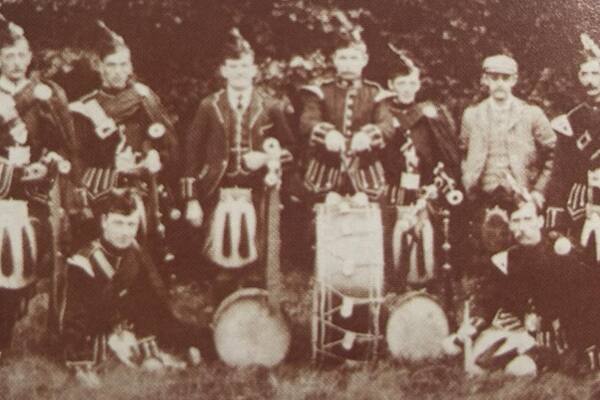
History
Founded in early 1906 and known as the Vale of Atholl Pipers’ Association, the pipe band wore the Murray of Atholl tartan.
The Patron of the band in 1906 was The Most Hon. The Marquis of Tullibardine DSO and the Pipe Major was Mitchell Pirnie.
‘The Vale’ is believed to be one of the first Scottish pipe bands to broadcast on radio in 1928 and each member was given a print of the photograph taken for the Radio Times.
Such was the hardship in those days it is noted in the early minute books that the Vale travelled in a ‘charabanc’ around the villages of Highland Perthshire, stopping off to give performances and collect donations. In the late 1960s, the Vale created the first ‘Highland Night’ of the tourist season in Pitlochry – where the band presented an outdoor production of traditional entertainment every week during the summer months. This tradition is still going strong. Click here to find out more.
Those early competitive outings would prove to be only the prelude to a much more focused future in pipe band competition. In 1965, Ian Duncan joined the Vale and took over as Pipe Major in 1973.
At its first major pipe band competition in 1977 the band was awarded sixth place in the Grade 4 World Championship. The following year it won all the Grade 4 Championships including the Worlds title. Promotion to Grade 3 was a formality but this only extended the Vale’s horizons because it immediately cleared every hurdle in that grade including, once again, the World Championships. The next three years saw the band in Grade 2 winning many of the top trophies, including the Scottish and British Championships.
At the end of 1983 the Vale was promoted to Grade 1, achieving the jump from Grade 4 to Grade 1 in only seven seasons.
After an exhaustive search for additional funding from a sponsor a partnership was agreed with Scotrail, the national train operating company of Scotland.
The versatility and individual style of the band’s first class solo players was showcased in a cassette recording called Salutations where no less than 14 different members of the band were featured on instruments as diverse as xylophone and bouzouki, in addition to the bellows-blown small pipes and Great Highland Bagpipe.
The band’s 1987 recording Both Sides of the Tracks has been acclaimed as one of the greats. The band’s follow up recording, No Reservations, included a wide variety of melodies from Ireland, Bulgaria, Mexico, Spain and even some classical melodies – as well as traditional and contemporary Scottish compositions. This album was awarded a Silver Disc for its worldwide sales.
The late 1980s saw the Vale placed second (twice) in the Champion of Champions Grade 1 table where it secured the European and British Championship titles at Glenrothes in seasons 1988 and 1989 respectively. Also at this time it travelled on a two week tour of the USA and Canada competing at the North American Championships at Maxville only to be beaten by the 78th Fraser Highlanders. This was followed up by a trip to Japan the following year.
With a wide range of music in their repertoire the band became a popular choice for concert promoters. In 1990 the Vale performed at the famous concert in Ballymena, Northern Ireland. The show was recorded for BBC Radio Scotland and later released on video.
As plans pressed ahead around this time to restructure the railways of Great Britain the Scotrail sponsorship ended. In 1993 sponsorship was agreed with Macnaughtons of Pitlochry, specialists in highland wear. This partnership lasted over ten years and saw the band change from its traditional Murray of Atholl tartan to the Muted Macnaughton and strengthened the band’s link with its home town even further.
This spell for the organisation as a whole was particularly successful. James King joined the Grade 1 band as leading drummer as the Grade 1 band re-established itself as a contender at the major championships. The Vale’s concert tradition also continued as it was invited to play at the Motherwell Civic Centre – the prior venue for Glasgow Skye’s pre-Worlds concert, where the CD Live ‘n Well was recorded.
In 1999 the Vale Grade 1 band had its most successful season, winning prizes at all five major pipe band competitions. A year later the band was one of four bands invited to play at the Millennium Concert in the Glasgow Royal Concert Hall.
Ian Duncan stepped down as Pipe Major at the end of the 2000 season and was succeeded by Andy Renwick. After two seasons without any long term funding the Vale of Atholl secured a deal with Robert Wiseman Dairies (now owned by Müller). Adrian Cramb was appointed Pipe Major at the end of the 2008 after Andy stepped down, becoming Pipe Sergeant.
Today
The Grade 1 band came to an abrupt end in 2018 and the Association decided to rebuild from the bottom up by concentrating on its tuition programme and its Grade 3A and 4A bands, also returning to its pre-1993 Murray of Atholl tartan.
After prize-winning seasons in Grade 3A in 2022, 2023 and 2024 the band was promoted to Grade 2 for the 2025 season, underlining its ethos of rebuilding from grass roots.
The Grade 4A band also continues to go from strength to strength, winning prizes in minor competitions in 2024 and qualifying for the G4A finals at the Worlds.
'Mon the Vale!




Learn more on Wikipedia


